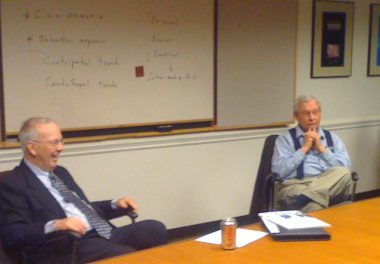Almost 40 years ago, University of North Carolina Chapel Hill professors Donald Shaw and Max McCombs introduced a theory that drastically changed the field of communications. Earlier in the semester, Elon students got the opportunity to learn about it firsthand from one of the men who originally devised it in a half-semester agenda-setting course.

“My goal was to tell students how media set public agendas, thereby influencing community life,” Shaw said. “I would like students to not only understand agenda-setting theory, but also to be able to use it.”
The agenda-setting theory details how the media affect public opinion by noting that there is a positive correlation between how often a particular topic is covered in the media and how important the public believes that topic to be. According to the theory, the media play an important role in determining how the public thinks and feels about major events and issues.
While students may not consciously think about the agenda-setting theory in their future careers, Shaw hopes that by learning about it they will be able to innately keep it in mind once they enter the field of mass media.
“It is good because it is there in the back of your mind and you know what kind of power a person in the media has,” said Elon senior Erik Kendall, a student who took Shaw’s class. “When you’re writing a story or making a video, you are not directly thinking of agenda setting, but when you do your final edit you need realize how it will eventually hold a place in people’s minds.”
All communications students are given a summary of what the agenda-setting theory is during their introductory communications courses, but Shaw’s class took it a step further by exploring different avenues and meanings of the theory. Many of the class discussions were geared toward the application of agenda-setting in today’s world of digital media.
“You can tell he has thought about this topic for longer than anyone would want to and he has explored just about every angle of it in his mind,” Kendall said. “Media is not in a vacuum and he is cognizant of that and is trying to use the ideas students give him to expand the theory.”
As a visiting professor, Shaw will not be back to teach the same class next semester, but he said he enjoyed his time in a smaller school environment that’s drastically different from Chapel Hill.
“I came to know every member of my class individually because they participated so much in discussions, and I had plenty of opportunities to read materials or papers they wrote,” Shaw said. “I talked with many students about their other research and courses and got to know them somewhat on a personal basis. Elon is a most impressive university. The university comprises good students, good faculty and everything else.”
— by Lindsay Fendt, ’11


